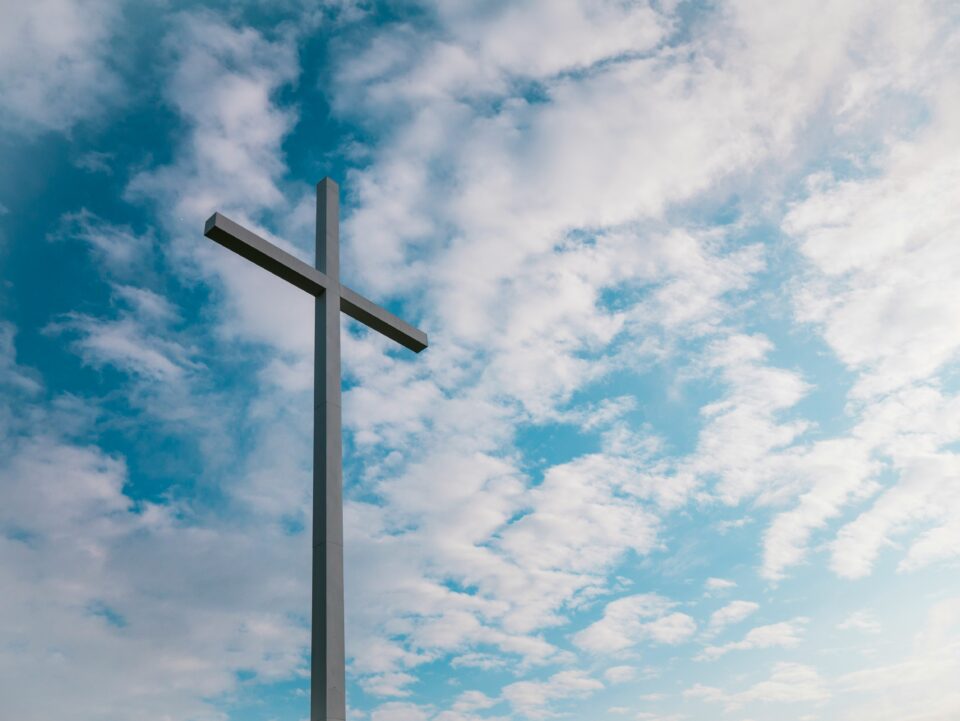
If Maundy Thursday looked bleak in the Easter story, then how much more so Good Friday. It can be hard to determine why it’s called “good”!
On the Thursday night Jesus has been tried by the Jewish authorities and found guilty of blasphemy and worthy of death (Matthew 26:65-66). In Matthew’s account, we start Good Friday with the betraying apostle, Judas, killing himself (Matthew 27:5). Then we have the story of a great miscarriage of justice, of brutality, mockery, crucifixion and death. Good Friday ends with an innocent man, who has been executed on a cross, being buried in a cave tomb. What hope is there in such a story and why have Christians called it Good Friday?
Well once again though the text is shot through with signs of hope. In this post I’m going to look at one particular set of hopeful signs in Matthew’s gospel and that is the way that the events of Good Friday are a fulfillment of Old Testament prophecy
Fulfillment
There are too many references and allusions to the Old Testament in Matthew 27 to cover in one blog post. So I want to look at two Old Testament passages that seems to be very much in Matthew’s mind throughout the chapter.
Psalm 22
In Matthew 27, the only words we have from Jesus on the cross are:
About three in the afternoon Jesus cried out in a loud voice, “Eli, Eli, lema sabachthani?” (which means “My God, my God, why have you forsaken me?”).
(Matthew 27:46 NIV)
which is a direct quote from Psalm 22:1. The Psalm was written by Israel’s greatest Old Testament king, King David. It is his cry to God in the face of extreme suffering and death.
If you read Psalm 22 through you will find a number more parallels to the crucifixion of Jesus e.g.:
- the scorn and mockery (Matthew 27:39, 43; Psalm 22:7, 8)
- the piercing of hands and feet (pointing to crucifixion Matthew 27:35; Luke 24:40; John 20:25; Psalm 22:16)
- the gambling for his clothes (Matthew 27:35; Psalm 22:18).
Matthew clearly sees the suffering that God’s king experienced in the Old Testament as a pattern fulfilled by God’s ultimate king – Jesus.
The “Servant Songs” in Isaiah
Alongside this, there are clear echoes of another sufferer from the Old Testament, the servant in Isaiah. The are a number of “Servant Songs” in the prophecy of Isaiah and the New Testament picks up this picture and applies it to Jesus. We see that especially in the crucifixion account in Matthew 27. For example:
- The servant is silent before his accusers (Matthew 27:12, 14; Isaiah 53:7)
- The servant is innocent (Matthew 27:19; Isaiah 53:9)
- The servant is despised and rejected (Matthew 27:22-23, 39-44; Isaiah 53:3)
- The servant is beaten, mocked and spat on (Matthew 27:26, 30-31; Isaiah 50:6)
- The servant was pierced, cut off from the land of the living etc. (Matthew 27:35, 50; Isaiah 53:5, 8)
- The servant is assigned a grave with sinners and the rich (Matthew 27:57-60; Isaiah 53:9).
Signs of Hope
Now while these two Old Testament passages seem to offer a fairly bleak picture of the suffering king/servant they offer us a number of signs of hope.
The Plan of God
We can read the story of Jesus as a terrible tragedy where events and evil and weak people overtook a good man, leaving him dead. In one sense, this is true. We are right to see that human evil killed the one good person whoever lived. The way that both Jew and Gentile conspired to kill him, with the whole crowd involved is supposed to point us to this.
The Stuart Townend hymn “How Deep the Father’s Love” captures this well:
Behold the man upon a cross,
Stuart Townend Copyright © 1995 Thankyou Music (Adm. by CapitolCMGPublishing.com excl. UK & Europe, adm. by Integrity Music, part of the David C Cook family, songs@integritymusic.com)
My sin upon His shoulders;
Ashamed, I hear my mocking voice
Call out among the scoffers.
It was my sin that held Him there
However, this wasn’t a slip up by God, as if he took his eye of the ball for a moment. This was always the plan of God. That what happened was a clear fulfillment of what was prophesied in the Old Testament shows this. At Pentecost the apostle Peter puts it this way:
This man was handed over to you by God’s deliberate plan and foreknowledge; and you, with the help of wicked men, put him to death by nailing him to the cross.
(Acts 2:23 NIV)
However bleak Good Friday may seem, it is part of God’s plan. As we’ll see it’s the most wonderful plan to save his people. There’s both hope in the story and hope in our world because God is in control, not humans, and God is good and working his good purposes out.
The Purpose of God
If it was part of the plan of God, then what purpose did the death of Jesus on Good Friday have in his plan?
As we read Matthew’s account we get some indications.
- The mockery about saving himself and others ironically points to what is actually going on (Matthew 27:39-43). Jesus does not save himself because by his death he is saving others.
- The darkness (Matthew 27:45) suggests God’s judgement of sin.
- Jesus’ quote of Psalm 22:1in Matthew 27:46 suggests a separation from God. Is this separation because of sin? Why, given he is an innocent man?
- The tearing of the temple curtain (Matthew 27:51) is suggestive. The curtain prevented people from entering the presence of God in the temple. Has the death of Jesus somehow opened the way into the presence of God?
In many ways Isaiah 53 helps us put this together. We read there:
Surely he took up our pain and bore our suffering, yet we considered him punished by God, stricken by him, and afflicted. But he was pierced for our transgressions, he was crushed for our iniquities; the punishment that brought us peace was on him, and by his wounds we are healed. We all, like sheep, have gone astray, each of us has turned to our own way; and the LORD has laid on him the iniquity of us all.
(Isaiah 53:4-6 NIV)
Our sin (yes, we have all like sheep sinned) not only put Jesus on the cross, he also took it on himself on the cross (the LORD laid our iniquity on him). There was a sense in which he was separated from God, because sin separates humans from God. He was innocent, and that made him was a worthy to take our sin upon himself as a sacrifice for us.
In doing that, Jesus took God’s judgment for our sin on himself, so that we no longer have to (he was pierced for our transgression etc.). If we trust in Jesus, we are no longer separated from God, rather we are healed and have peace with God (the curtain has been torn in two for us!). Jesus could not save himself from the cross because he was saving us.
The purpose of the cross is the central “good” of Good Friday and a massive sign of hope for humanity. All of us have sinned. All of us face God’s judgement and punishment for our sin, but Jesus has taken that judgment and punishment on himself. If we trust Jesus then we too can be healed, saved and have peace with God, not just now, but for all eternity.
The Future with God
The striking thing about both Psalm 22 and Isaiah 53 is that they don’t end in death, but in victory.
After praying for deliverance David writes of his future:
I will declare your name to my people; in the assembly I will praise you. You who fear the LORD, praise him! All you descendants of Jacob, honor him! Revere him, all you descendants of Israel! For he has not despised or scorned the suffering of the afflicted one; he has not hidden his face from him but has listened to his cry for help.
(Psalm 22:22-24 NIV)
God does not leave his king in the grave!
Similarly, in Isaiah 53 we read:
Yet it was the LORD’s will to crush him and cause him to suffer, and though the LORD makes his life an offering for sin, he will see his offspring and prolong his days, and the will of the LORD will prosper in his hand. After he has suffered, he will see the light of life and be satisfied; by his knowledge my righteous servant will justify many, and he will bear their iniquities. Therefore I will give him a portion among the great, and he will divide the spoils with the strong, because he poured out his life unto death, and was numbered with the transgressors. For he bore the sin of many, and made intercession for the transgressors.
(Isaiah 53:10-12 NIV)
After his suffering and death, the servant will have life again.
In short, part of the hope in the story of Good Friday is the resurrection of Easter Sunday. It’s a hope that confirms what Jesus has done to save us, but more than that it’s a hope that offers not just Jesus eternal life with his Father, but us too (I think that’s implication of the other “resurrections” in Matthew 27:52-53). It gives us what is often called, the hope of heaven.
There’s much more to say, but I hope from reading this you can see that Good Friday is good and full of hope. Hope that the good plans of a good God then and now are being fulfilled. Hope that our sins can be forgiven and our relationship with God can be restored. Hope that we can be saved for eternity to live with God forever.
